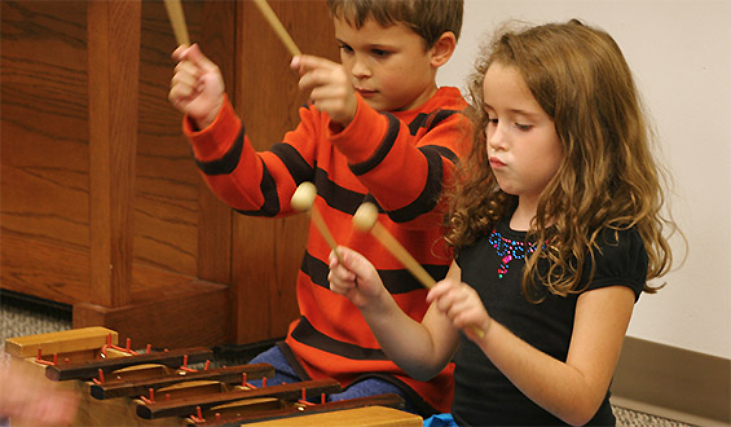
Education News
“Over and over, we’ve learned that children need rich, multisensory environments, and learning music … brings all of that into a package for them.”
From Education News:
Researchers at Northwestern University in Illinois believe that musical training plays an important role in educational achievement.
A study was conducted by the university’s auditory neuroscience laboratory after a tip from Margaret Martin, founder of the non-profit Harmony Project in Los Angeles noticed that 90% of her students graduated, while 50% or more from the same neighborhoods did not.
John Rogers of the Associated Press writes that a two-year study of 44 children in the program showed that the brain is changed when studying music, making it easier for young people to process sounds, according a paper published this week in The Journal of Neuroscience. That increased ability can improve skills in subjects such as reading and speech.
The catch is that the child has to actually play the instrument to get smarter. To help understand this outcome and how it effects teaching and learning methods will take more years, according to researchers.
“Over and over, we’ve learned that children need rich, multisensory environments, and learning music sort of brings all of that into a package for them,” said Mary Luehrsen of the National Association of Music Merchants Foundation, which awards scholarships and research grants for the study of music, adding that the results make the point that music training should be an important part of all school curricula.”
One year of music study does not make a difference in brain changes, but two years can.
“We know that a fundamental characteristic of the nervous system is our ability to change as we age, as we interact with our environment. But we can’t be changing every second or you’d have a very unstable system,” Kraus said.
Previous studies have shown, says April Benasich, professor of neuroscience at Rutgers University, that music can “improve concentration, memory, and focus in children”.
It is already known in scientific circles that low-income young people have brains that take more time to pick words out of the sounds they hear, reports Linda Carroll of Today. This could be because they hear fewer spoken words than their higher-income counterparts. One study showed that poor children had heard 30 million fewer words by the time they were only three years old. Kids from working class families fell between the poorer kids and the wealthy children.
Jamie Morales understands, because her 13-year-old learned music at the Harmony Project.
“There was a big change in her attitude and she began to like school more,” said the 51-year-old social worker from La Habra, California. “Since about the second year, she started getting straight A’s in school and her teachers asked me what happened, since she changed so much. She began to dream about going to the University of Oxford in England and to become an anesthesiologist.”
In California, the San Jose Jazz Progressions program is bringing at-risk instruments and music instruction. Ely Lopez’s father says that he can now pick out notes of the trumpets when he is listening to recordings. He also has noticed changes in his son’s ability to look at things more deeply. In fact, says Lopez, he is just a better person in general.
Greg Toppo of USA Today reports that Kraus found that a musician experiences music through their fingers and throughout their body. The work involved in learning how to play a musical instrument engages the brain’s “cognitive, sensory, and reward circuits. The new research, she says, is, “just the tip of the iceberg“.
This article originally appeared on Education News.





























